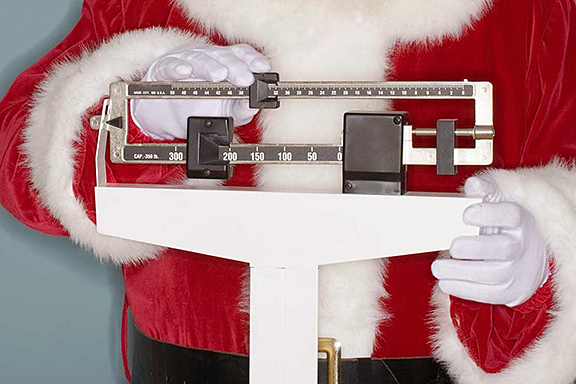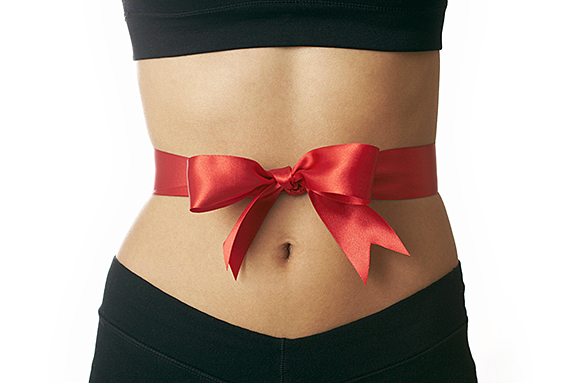How to Avoid Holiday Weight Gain
Ahh, the holiday season. A time for family, friends, gifts, and a whole lot of food. The key words here are a “whole lot” and “food.” Holiday weight gain is a common concern for many adults. Everywhere we turn there are office parties and family gatherings that encourage overeating, sedentary behavior, and the consumption of calorie-rich foods.
Did you know that the average American consumes 4,500 calories and 230 grams of fat on just Thanksgiving Day alone? In fact, between mid-November and mid-January, we gain an average of 1 pound. This may not seem like a lot, but most people don’t lose this extra baggage. Therefore, holidays (no matter the time of year) can be one of the biggest contributors to our total annual weight gain.
Let’s be honest with each other. It’s really hard to stay motivated this time of year! It’s even harder to stay committed to our workout routine. With the days getting shorter and the colder weather settling in our ambition to workout diminishes with each passing day.
It is possible to keep up your momentum all year round. You just need to have a plan, stay focused, and most importantly you have to keep moving! Here are a few tips to help you avoid holiday weight gain:
- Limit your dessert intake. Desserts are everywhere during the holiday season. Instead of taste-testing everything in sight, focus on your favorites, limit your portions, and skip the rest.
- Weigh yourself regularly. Stepping on the scale once or twice a week during the holidays can help keep your weight in check, allowing you to take action before significant weight gain sets in.
- Bring a healthy dish to share. Holiday parties can be a common set back in the battle against holiday weight gain. In these instances, you often have little or no control over the food that’s served. The good news is, you can have control over what you eat. Simply bring your own healthy dish to share with others.
- Get plenty of rest. Sleep deprivation, which is quite common during the holidays, can contribute to weight gain. This is because those who do not sleep enough tend to be hungrier, consume more calo-ries, and exercise less.
- Keep meals balanced with protein. Holiday meals are typically rich in carbs and low in protein. It’s important to include some protein with every meal, as it promotes fullness and helps with weight main-tenance. In addition, eating protein with meals may automatically reduce calorie intake by reducing hunger and appetite.
- Don’t skip meals. Eat your normal meals at their regular scheduled times. You will be less likely to overeat if you keep yourself satisfied throughout the day.
- Go easy on the alcohol. Alcohol can increase your appetite and lower your resolve to resist overeating. In addition, many holiday drinks have as many or more calories than a dessert.
- Keep moving. Here’s a fact for you. Thinking about going to the gym burns between zero and zero calories. Even if you only have the time to fit in twenty minutes a day, it’s better than doing nothing at all.
- Be active with family and friends. Sedentary activities, such as sitting on the couch, are common holiday traditions for many families. When this is accompanied by eating excessive amounts of food it’s a recipe for disaster. Get out and do seasonal activities the whole family can enjoy.
- Learn to manage stress. Stress associated with the holidays can be a huge trigger for people with little or no self-control. Make sure you carve out some time for an activity that helps you relax each day.
- Watch your portion sizes. When the holidays arrive, it can be easy to overload your plate. Those who eat larger portions tend to gain weight more easily than those who do not. The best way to overcome this is to control portion sizes or use smaller plates. Remember to eat mindfully, chew slowly and thoroughly, and minimize distractions.
- Draw the line. During the holiday season, many people have an “I’ll start tomorrow” mentality, which can end up prolonging unhealthy habits. If you’re serious about controlling your weight, it may be helpful to draw the line, set limits for yourself, and stick to your goals regarding food intake

How to Measure Your Waist
Your waist circumference is a clue to whether you’re at higher risk for type 2 diabetes, high blood pressure, high cholesterol, and heart disease. It’s easy to do and all you need is a tape measure.
• Start at the top of your hip bone, then bring the tape measure all the way around your body, level with your belly button.
• Make sure it’s not too tight and that it’s straight, even at the back. Don’t hold your breath while measuring.
• Check the number on the tape measure right after you exhale.
For your best health, your waist should be less than 40 inches around for men, and less than 35 inches for women. If it’s larger than that, you will most likely need to consume fewer calories and get to the gym more often!

In Conclusion:
While staying on top of your weight goals can feel daunting during the holiday season, it is possible to keep things in check. You just need to have a plan, stay focused, and make sure you keep moving!
There’s nothing wrong with the holiday season itself. You should enjoy every little detail it has to offer. The key is to keep your eating to the holiday, not to the holiday season. Wishing you peace, joy, and good health this holiday season. Good luck to you!











